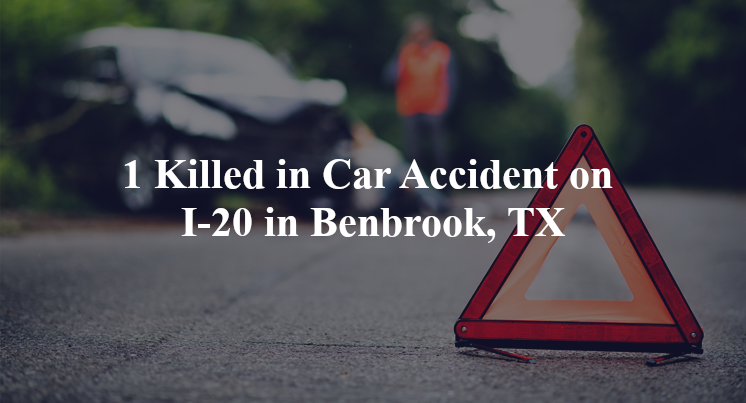1 Killed in Car Accident on I-20 in Benbrook, TX
Benbrook, TX — March 31, 2025, One person was killed following a car accident that occurred at around 6:00 P.M. on I-20.

An investigation is underway into a car accident that left one person dead during the evening hours of March 31st. According to official reports, a vehicle was traveling on Interstate 20 near Winscott Road when for unknown reasons the vehicle lost control and was involved in a rollover accident, the details of which are still be investigated.
When first responders arrived on the scene, they found that one person had been ejected and one person sustained fatal injuries. It is currently unknown how many people were involved in the collision, and at this time there has been no further information released about the accident, including the identities and number of people involved, however this remains an ongoing investigation and more details may be released in the future.
Commentary
When a crash involves a rollover and someone is ejected from the vehicle, it raises serious questions that go far beyond whether the driver lost control. These types of incidents can appear straightforward—one vehicle, no other cars reported—but that doesn’t mean the explanation ends there. In fact, some of the most important factors in these cases are often overlooked unless someone takes the time to ask three fundamental questions: Did the authorities thoroughly investigate the crash? Has anyone considered whether a vehicle defect may have contributed? And has all the relevant electronic data been collected and preserved?
This particular crash occurred on Interstate 20 and involved a rollover for reasons that remain unclear. That uncertainty underscores the need for a comprehensive investigation. Proper crash analysis requires more than a cursory report—it demands accident reconstruction, evaluation of the roadway, visibility, and vehicle dynamics, and interviews with anyone who may have witnessed the event. The presence of an ejection and a fatality also suggests a need to examine whether all safety systems functioned as designed. Unfortunately, not all investigating agencies have the resources or training necessary to conduct this level of review consistently.
The second question—whether a vehicle defect contributed to the crash or the severity of the injuries—is especially important in rollovers. Defects in tire design, suspension, or steering components can cause a loss of control. And when someone is ejected, it raises the possibility of seat belt failures, door latch issues, or roof strength deficiencies—all of which can turn a survivable crash into a deadly one. These types of failures require a forensic examination of the vehicle, and unless someone steps in to preserve it, that opportunity can quickly be lost.
The third critical issue is whether all the electronic data has been secured. Most modern vehicles are equipped with electronic control modules (ECMs) that record data just before a crash—things like speed, steering input, brake usage, and engine status. That data can provide clear insight into how the vehicle was behaving in the moments before it rolled over. Additional sources such as dashcams, cell phone records, or nearby surveillance footage may also hold valuable clues. But this evidence doesn’t preserve itself—if steps aren’t taken quickly, it can be overwritten or lost.
Until these three questions are answered, we’re left with more speculation than clarity. Rollover crashes can be incredibly complex, and in the absence of other vehicles or obvious causes, it’s tempting to assume the incident was simply the result of a mistake or a moment of bad luck. But for those affected—and for the broader goal of roadway safety—it’s essential to dig deeper. Only a thorough, evidence-based investigation can uncover what really happened and whether anything could have been done to prevent it.

*We appreciate your feedback and welcome anyone to comment on our blog entries, however all visitor blog comments must be approved by the site moderator prior to showing live on the site. By submitting a blog comment you acknowledge that your post may appear live on the site for any visitors to see, pending moderator approval. The operators of this site are not responsible for the accuracy or content of the comments made by site visitors. By submitting a comment, blog post, or email to this site you acknowledge that you may receive a response with regard to your questions or concerns. If you contact Grossman Law Offices using this online form, your message will not create an attorney-client relationship and will not necessarily be treated as privileged or confidential! You should not send sensitive or confidential information via the Internet. Since the Internet is not necessarily a secure environment, it is not possible to ensure that your message sent via the Internet might be kept secure and confidential. When you fill out a contact or comment form, send us an email directly, initiate a chat session or call us, you acknowledge we may use your contact information to communicate with you in the future for marketing purposes, but such marketing will always be done in an ethical way.